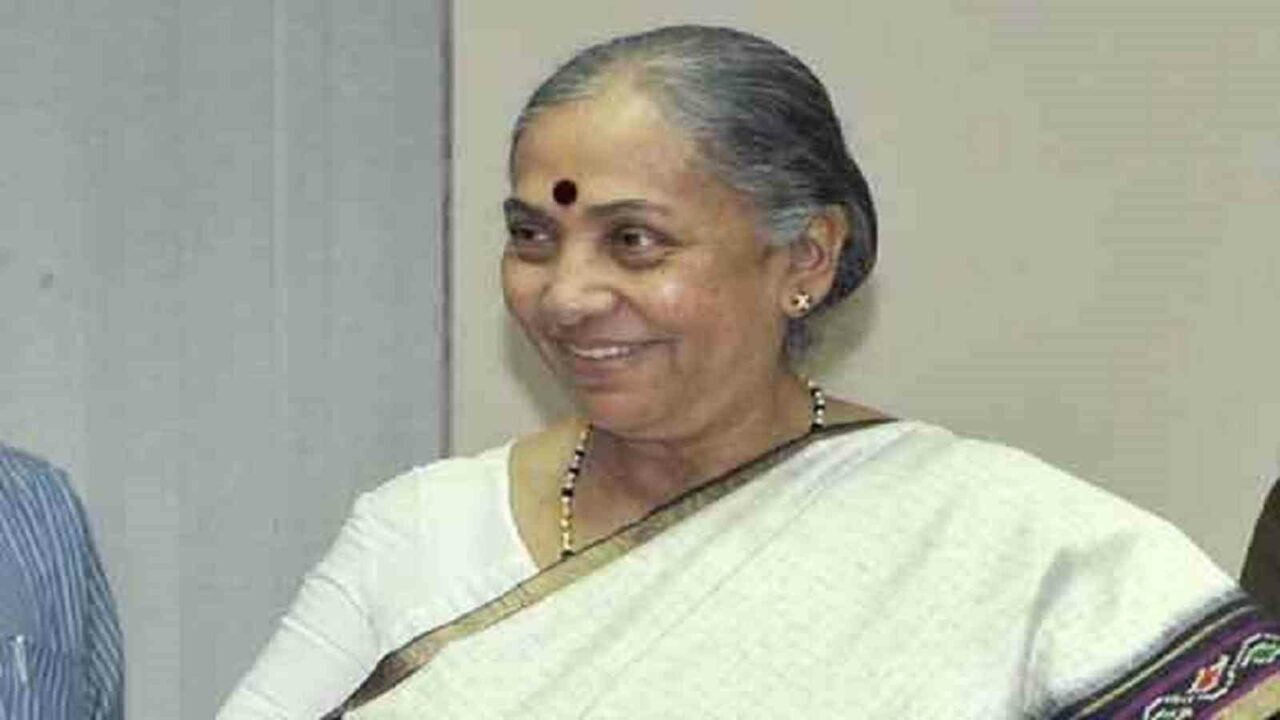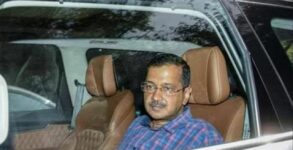The joint Opposition candidate for the vice presidential election Margaret Alva may be fighting a lost battle with numbers firmly stacked against her and due to the growing disunity among non-BJP parties, but she has said she is hardly perturbed and feels the numbers can always swing.
”We can’t just sit back and say we don’t have the numbers, so we won’t fight an election,” she added. With less than a fortnight to go for the August 6 vice presidential election, the former governor told PTI in an interview Mamata Banerjee has ”enough time” to rethink her party Trinamool Congress’ decision to abstain from the poll.
The multi-term parliamentarian also shared her thoughts about the changes she has witnessed over the years in public life. ”It is frightening when I look around,” she says. ”You cannot eat what you want, you cannot wear what you want, you cannot say what you want, you cannot even meet people you want. What is this time?” she says.
Alva will launch her campaign for the poll Monday afternoon, meeting MPs of various parties in the Central Hall of Parliament Excerpts from the interview: Q. The numbers in the electoral college are clearly stacked against the Opposition and some ask why contest a losing battle? A. Because the numbers are stacked against us, we should not fight the election? I think in a democratic system, win or loss, you have to accept the challenge and place your point of view before your MPs who are now in the electoral college. We have a different point of view from the government and the need is for those who are on a common platform to accept the challenge.
I was approached by the opposition parties to be their representative in this election, and though I had gone back to Bangalore and settled in, I thought this challenge had to be faced and I said yes. We all understand winning and losing are part of an election.
Q. The Opposition TMC has said that they will abstain from the vice presidential poll. How do you see their position? A. I am aghast at that announcement. Mamata (Banerjee) has been leading the entire movement to unite the Opposition. She has been my friend for many years and I believe that there is enough time for her to change her mind.
Q. Does this not expose disunity in the Opposition? A. It’s like a family quarrel. There are sometimes differences, different perceptions, and maybe different situations. But, we will sit and talk and sort it out. She is very much part of us and her basic ideology is that of the Congress. I always consider her one of us. I believe we can sit and sort out any differences that have arisen. She has been fighting the BJP all along. There is no way she can help the BJP win.
Q. The recent presidential poll has also exposed a lot of chinks in the Opposition. There was cross-voting in several states in favour of NDA nominee Droupadi Murmu.
A. The same thing can happen and votes can come to this side. Cross-voting is something which has become the rule of the day. The idea of electing a tribal woman, I think, played a very important part and she deserves to become the President. I congratulate her. She was the first tribal woman candidate and I am the first woman vice presidential candidate from the South.
Q. What is your objective in contesting this vice presidential poll knowing already what the outcome would be? A. The objective is not mine. The Opposition parties wanted a person who was acceptable to all of them and they requested me to be their candidate. And though the numbers are stacked against the Opposition at the moment, I said yes and accepted the challenge.
We can’t just sit back and say we don’t have the numbers so we don’t fight an election. And in an election like this, the numbers can swing.
Q. Yashwant Sinha, the Opposition candidate in the recently-concluded presidential poll, alleged there was the use of money power in the election.
A. The tragedy is that in today’s democratic system, it is not the mandate of the people that prevails. Take Karnataka, take Maharashtra, take Madhya Pradesh. In various states, the mandate of the people is ignored and muscle power, money power, and threats change the composition of the elected framework.
Q. You have been an accomplished politician and served as governor of four states. Do you think it would reflect better on national unity if the president and vice president were elected by consensus? A. I agree. The government should, therefore, think of supporting me. It would have been good if a consensus would have been worked out for both these posts by negotiating with all the parties.
Q. How do you view the emphatic win of Droupadi Murmu? A. I think it was a foregone conclusion because the MLAs also voted and the BJP had also the states. Yet, I must say Mr Sinha put up a very impressive fight. He raised issues and points which are of concern to the country today.
There are always differences of opinion, even between the BJP and its allies on many issues. Opposition parties are making efforts to sink their differences and work together. Before the general elections, I think they feel the need and the urgency of finding a common platform to face the challenge of 2024.
There might be ups and downs, differences. But the intention is clear. They are concerned and they want to make a point. The Constitution has to be defended and democratic institutions have to be protected. We do not want a one-party rule.
Q. You have been a presiding officer in both the Houses of Parliament, what do you have to say on the politics of disruptions emerging as a regular feature in Parliament.
A. It is very unfortunate. But the point is why are there disruptions? It is because the Chair is unable to work out compromises and work out a way by which the point of view of the Opposition and their demands for discussion and debate can be worked into the agenda of the House. You can’t just pass 22 bills in 12 minutes, without debate, without discussion, without any kind of consideration. Even budgetary grants have been passed without debate in the House. And this is the taxpayers’ money, which the representatives must have a say.
How can democracy function like this? The government’s slogan seems to be either my way or no way. For the last three days, they have been asking for a discussion on the GST. Things like foodstuffs being taxed and prices going up because of new GST rules. You don’t allow a discussion and you don’t want to hear a point of view which is different from yours. It is the people suffering outside – common people, the voter, the taxpayer.
Q. There have also been questions about the need for an upper house, and it has been projected as an obstructionist House.
A. The Upper House has seen stalwarts, who stood up, who fought, who differed, who attacked the government, and Indira Gandhi or whoever they wanted as prime minister. But there was debate, there was the right to speak and you’ve listened. After all, what is Parliament but a chamber for discussion, debate, and for working out compromises and consensus? The majority votes, let them vote, but the point of view of the minority in the House cannot be brushed aside. They are elected representatives of their states, of their constituencies.
Q. Your opponent has been a former Governor of West Bengal. Your assessment.
A. He has been a Governor, I have been a Governor. He has been a lawyer and so am I. Well, he has been fighting a woman (West Bengal Chief Minister Mamata Banerjee) in the state, and now he is fighting another woman in the election. Something in his stars. He has also been an MP and a minister.
Q. He has also been known for his strong political positions.
A. Therefore, he is being rewarded. I have also been a governor and you are supposed to be non-partisan. You are supposed to help your government function. There is a Lakshman Rekha, which you have to keep in mind, once you are in the Raj Bhawan. You can’t sit there and function as the representative of your party. I think it is unethical and unconstitutional.
Q. It is rather strange that none of your children is in politics, whereas you come from a political family.
A. My youngest son is in politics. My parents-in-law were the first couple in Parliament, both were freedom fighters.
Q. What is your take on dynastic politics, because the prime minister has been attacking family-based parties.
A. How many are there in the BJP? I don’t want to name them. Every single political party has its quota of family members who either succeed or come in after their parents or grandparents. If a doctor’s son or a lawyer’s son can join his profession, or a businessman’s son joins his business, what is wrong in family members coming in (politics). But they must come in by merit. They have to fight elections. They have to be accepted by the people. In a democracy, if the people elect you, you are in and if the people reject you, you are out. Both Indira Gandhi and Sanjay Gandhi were defeated in the 1977 elections. The ultimate barometer is acceptance by people.
Q. Did you always want to be in politics or was it just by chance? A. I never imagined I would get into politics, though I was very active in the student’s movement. I married into a political family and came to Delhi. I had no intention, when I got married, of getting into politics. The 1969 split of the Congress sort of ignited young people to support Indira Gandhi. My mother-in-law died at that time and there was tremendous pressure to step in. The rest is history.
Q. How do you look back at your innings in politics? A. I must say that it was a different world when we came in. There was idealism, there was a commitment that we felt we had to fulfil. They were the early years of India’s independence. There were problems, but the spirit of a united nation without differences of community and religion. Caste politics has always been there. But, it wasn’t what it is today. There was tolerance, there was acceptance, there was understanding. If I may say so, a tolerant society.
Today, it is frightening when I look around. It’s a different world altogether. You cannot eat what you want, you cannot wear what you want, you cannot say what you want, you cannot even meet people you want. What is this time? Look at the Central Hall of Parliament. It was a place where you fought in the House but came out and sat together and joked, had a cup of coffee or tea or dosa together, and joked about the fight in the House. Now, people are afraid to sit. I had a couple of BJP friends with whom I had a cup of tea and I was told they were asked what they were talking about with me.
Q. Who has been your political mentor? A. Let me be honest – Indira Gandhi. She handpicked me for Parliament, after having heard me on a public platform in the state. And, of course, my parents-in-law with whom I worked very closely. But let me make it very clear that after the 1969 split, I have risen from a block president, which is the lowest unit of the Congress party, and have held every post and became a general secretary. But the opportunity was given to me by my party and its leadership. I became an MP, a minister and a general secretary. Hard work, commitment, and honest politics have been my watchword.

















